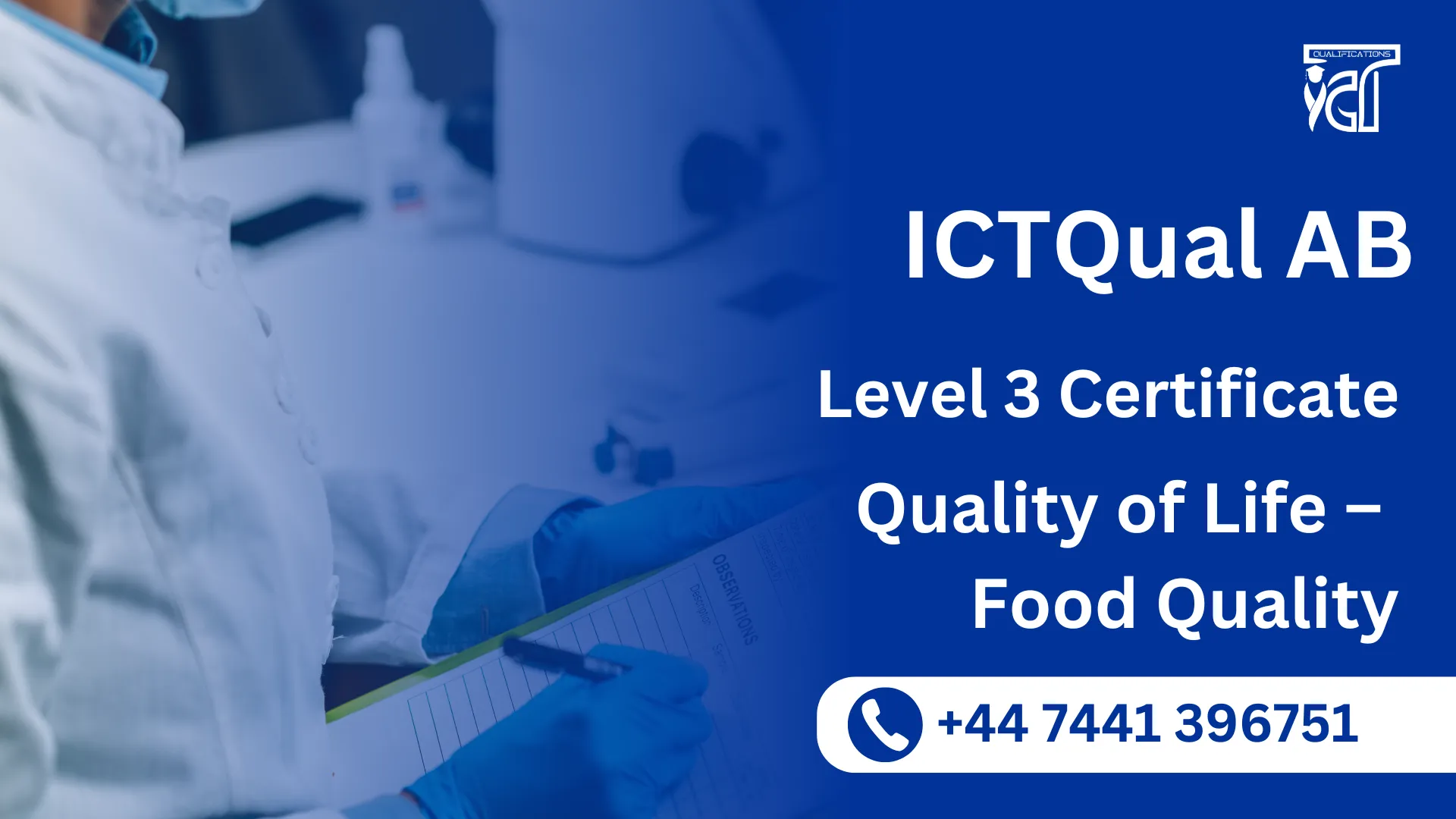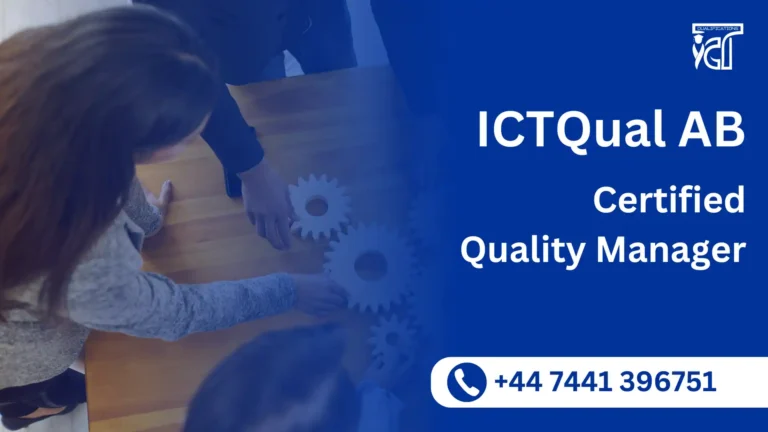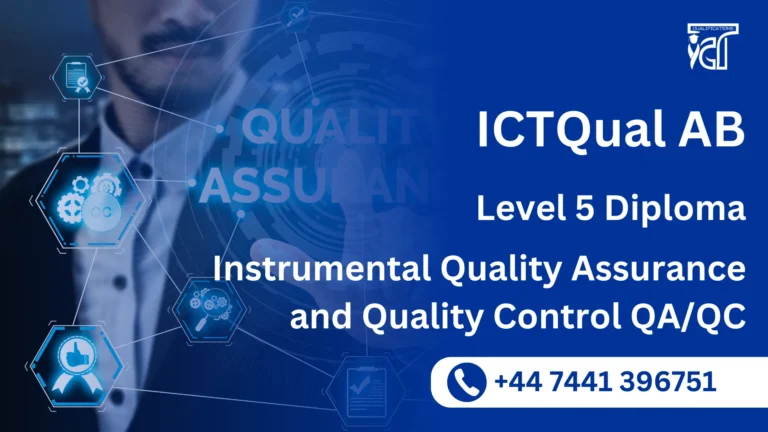The ICTQual AB Level 3 Certificate in Quality of Life – Food Quality is designed to explore how the standards, safety, and nutritional value of food directly influence human well-being and social development. Food quality is not only about taste and presentation but also about health, sustainability, and equity. This course emphasizes the importance of safe, nutritious, and accessible food as a cornerstone of quality of life.
Learners will examine the principles of food safety, nutritional adequacy, and sustainable production, alongside the cultural and social dimensions of food consumption. The program highlights how food quality impacts physical health, mental resilience, and community cohesion, while also addressing global challenges such as food security, ethical sourcing, and environmental responsibility.
Through case studies, reflective exercises, and applied learning, participants will gain practical insights into evaluating food standards, identifying risks, and promoting practices that enhance food quality. They will explore how innovation, regulation, and consumer awareness shape the food landscape and contribute to healthier, more sustainable societies.
Ultimately, this qualification equips learners with the knowledge to understand and advocate for food quality as a vital element of life satisfaction. It prepares them to contribute meaningfully to initiatives in nutrition, public health, food production, and community development, ensuring that individuals and societies benefit from safe, nutritious, and high-quality food.
ICTQual AB Level 3 Certificate in Quality of Life – Food Quality
This qualification, the ICTQual AB Level 3 Certificate in Quality of Life – Food Quality, consists of 3 mandatory units.
| Sr# | Unit Title |
| 1 | Foundations of Food Quality and Wellbeing |
| 2 | Food Safety, Hygiene, and Quality Assurance |
| 3 | Nutrition, Health, and Sustainable Food Systems |
Learning Outcomes for the ICTQual AB Level 3 Certificate in Quality of Life – Food Quality:
Foundations of Food Quality and Wellbeing
By the end of this unit, learners will be able to:
- Define the concept of food quality and explain its relationship to overall wellbeing.
- Analyse how food quality influences physical health, mental health, and life satisfaction.
- Identify cultural, social, and economic factors that shape perceptions of food quality.
- Evaluate the role of nutrition and dietary choices in enhancing quality of life.
- Demonstrate understanding of global food systems and their impact on communities.
- Compare international perspectives on food quality standards and consumer expectations.
- Reflect on the importance of food quality in building trust between producers and consumers.
- Apply theoretical frameworks to assess the contribution of food quality to sustainable living.
Food Safety, Hygiene, and Quality Assurance
By the end of this unit, learners will be able to:
- Explain the principles of food safety and hygiene in production, processing, and distribution.
- Identify common hazards and risks in food handling and propose preventive measures.
- Demonstrate understanding of quality assurance systems such as HACCP and ISO standards.
- Analyse case studies of food safety failures and evaluate lessons learned.
- Apply risk assessment techniques to ensure compliance with food safety regulations.
- Evaluate the role of inspection, monitoring, and certification in maintaining food quality.
- Reflect on the ethical responsibilities of food producers, handlers, and regulators.
- Propose strategies to improve food safety practices in hospitality, catering, or retail contexts.
Nutrition, Health, and Sustainable Food Systems
By the end of this unit, learners will be able to:
- Explain the role of nutrition in supporting physical and mental wellbeing.
- Analyse the impact of processed foods, additives, and labelling on consumer health.
- Evaluate the relationship between dietary patterns and long‑term health outcomes.
- Demonstrate awareness of global challenges in food security and nutrition equity.
- Assess the contribution of sustainable food systems to community health and wellbeing.
- Reflect on the importance of ethical and environmentally responsible food production.
- Compare approaches to nutrition education and public health campaigns across cultures.
- Propose strategies for promoting healthier and more sustainable food choices.
Food quality is a cornerstone of human well-being, influencing health, resilience, and social development. This qualification equips learners with the knowledge and skills to evaluate, promote, and advocate for safe, nutritious, and sustainable food practices that enhance quality of life at both individual and community levels.
1. Strengthened Knowledge of Food Standards and Safety
- Gain a clear understanding of food safety principles and nutritional adequacy.
- Learn how regulations, certifications, and monitoring systems ensure food quality.
- Understand the risks associated with poor food standards and how to mitigate them.
2. Enhanced Analytical and Practical Skills
- Develop the ability to assess food quality across production, distribution, and consumption stages.
- Learn to identify hazards, evaluate nutritional value, and recommend improvements.
- Strengthen problem-solving skills by addressing challenges in food security and sustainability.
3. Improved Awareness of Global and Social Issues
- Explore the role of food quality in public health, equity, and community well-being.
- Understand how cultural practices and consumer awareness shape food choices.
- Gain insights into ethical sourcing, environmental responsibility, and sustainable production.
4. Career and Professional Growth
- Position yourself for roles in nutrition, food safety, public health, or community development.
- Enhance employability in industries such as food production, hospitality, and health services.
- Acquire transferable skills in evaluation, advocacy, and sustainability.
- Build credibility for contributing to initiatives that improve food standards and access.
5. Contribution to Individual and Societal Well-Being
- Promote healthier lifestyles through knowledge of safe and nutritious food.
- Support communities in achieving food security and resilience.
- Advocate for practices that balance taste, health, and sustainability.
ICTQual AB Level 3 Certificate in Quality of Life – Food Quality is designed for individuals who want to understand how food quality impacts health, well-being, and social development. The ideal learner is someone motivated to explore the role of safe, nutritious, and sustainable food in enhancing quality of life.
1. Learners Interested in Health and Nutrition
- Individuals who value food as a foundation of physical and mental well-being.
- Those curious about how nutrition, safety, and dietary choices influence resilience and lifestyle.
- Learners motivated to connect food quality with long-term health outcomes.
2. Learners Focused on Food Safety and Standards
- Candidates who want to understand regulations, certifications, and monitoring systems that ensure food quality.
- Those interested in identifying risks in food production and consumption.
- Learners who enjoy evaluating processes to improve safety and compliance.
3. Learners Committed to Sustainability and Equity
- Individuals passionate about ethical sourcing, environmental responsibility, and sustainable food systems.
- Those who want to explore strategies for making nutritious food accessible to diverse communities.
- Learners motivated to advocate for fair and inclusive food practices globally and locally.
4. Learners Seeking Career and Professional Growth
- Early-career professionals aiming for roles in nutrition, food safety, hospitality, or public health.
- Experienced practitioners who want to expand their expertise in food quality and sustainability.
- Career changers seeking transferable skills in evaluation, advocacy, and community development.
- Learners aspiring to contribute to initiatives that strengthen food security and improve quality of life.
ICTQual AB Level 3 Certificate in Quality of Life – Food Quality provides learners with a strong foundation in understanding how food quality impacts health, well-being, and community development. It opens pathways to advanced study and professional opportunities in nutrition, food safety, and sustainable food systems.
1. Progression to Higher-Level Diplomas and Certifications
- Advance to Level 4 and Level 5 Diplomas in Food Safety Management, Nutrition and Health, or Quality of Life Studies.
- Pursue specialized certifications in Food Hygiene, ISO Food Standards, or Sustainable Food Production.
- Explore international programs in Public Health Nutrition or Food Security.
- Strengthen global employability with qualifications aligned to industry and regulatory standards.
2. Career Development Opportunities
- Move into roles such as Food Quality Inspector, Nutrition Advisor, or Community Health Worker.
- Progress into positions within food production, hospitality, healthcare, or public health organizations.
- Apply skills in industries focused on food safety, nutrition, and consumer protection.
- Enhance employability by demonstrating expertise in evaluating and promoting food quality.
3. Academic and Professional Pathways
- Use this qualification as a foundation for advanced study in nutrition, food science, or public health.
- Pursue higher-level diplomas or professional memberships in organizations focused on food safety and nutrition.
- Apply transferable skills in international contexts, supporting careers in global food systems and sustainability.
- Build credibility for roles in food auditing, compliance, and quality assurance.
4. Long-Term Growth and Specialization
- Specialize in areas such as Food Technology, Dietary Planning, Sustainable Agriculture, or Community Nutrition.
- Contribute to consultancy roles advising organizations on food quality and safety strategies.
- Prepare for leadership positions in sectors where food quality drives health and well-being.
Entry Requirements
Learners must meet the following criteria to be considered for admission into the course:
- Age Requirement: Learners must typically be 18 years of age or older at the time of enrolment
- Educational Background: Completion of secondary school education or equivalent qualification. Prior Level 2 qualifications in health, nutrition, hospitality, or science-related fields are helpful but not mandatory.
- Work Experience: While formal work experience is not mandatory, 6–12 months of exposure to food production, hospitality, nutrition, or community health environments is highly beneficial. Relevant experience may include roles in catering, food safety, public health projects, or community nutrition programs.
- English Language Proficiency: Competence in English or the language of instruction is required to engage with course materials and assessments. Recommended proficiency at CEFR A2–B1 level or equivalent, covering both written and spoken communication.
Register Now
Qualification Process
Qualification Process for the ICTQual AB Level 3 Certificate in Quality of Life – Food Quality
- Self-Assessment:
Begin by evaluating your eligibility to ensure you meet the qualification requirements, including work experience, knowledge, and language proficiency. - Registration:
Complete your registration by submitting the required documents, including a scanned copy of a valid ID, and paying the registration fee. - Induction:
An assessor will conduct an induction to confirm your eligibility for the course and explain the evidence requirements. If you do not meet the criteria, your registration will be cancelled, and the fee will be refunded. - Assignments & Evidence Submission:
Provide all assignments and the necessary evidence based on the assessment criteria outlined in the course. If you are unsure of the required evidence, consult with the assessor for guidance on the type and nature of evidence needed. - Feedback and Revision:
The assessor will review your submitted evidence and provide feedback. Evidence that meets the criteria will be marked as “Criteria Met,” while any gaps will be identified. You will be asked to revise and resubmit if needed. - Competence Evidence:
Submit final evidence demonstrating that all learning outcomes have been met. This evidence will be marked as “Criteria Met” by the assessor once it is satisfactory. - Internal Quality Assurance (IQA):
The Internal Quality Assurance Verifier (IQA) will review your evidence to ensure consistency, quality, and compliance with standards. - External Verification:
The IQA will submit your portfolio to ICTQUAL AB External Quality Assurance Verifiers (EQA) for final confirmation. The EQA may contact you directly to verify the authenticity of your evidence. - Certification:
Upon successful completion of all checks, ICTQUAL AB will issue your official certificate, confirming that you have attained the ICTQual AB Level 3 Certificate in Quality of Life – Food Quality.







